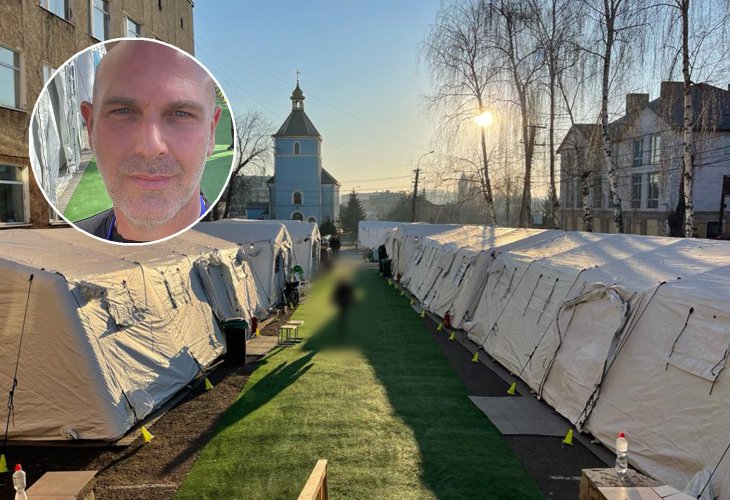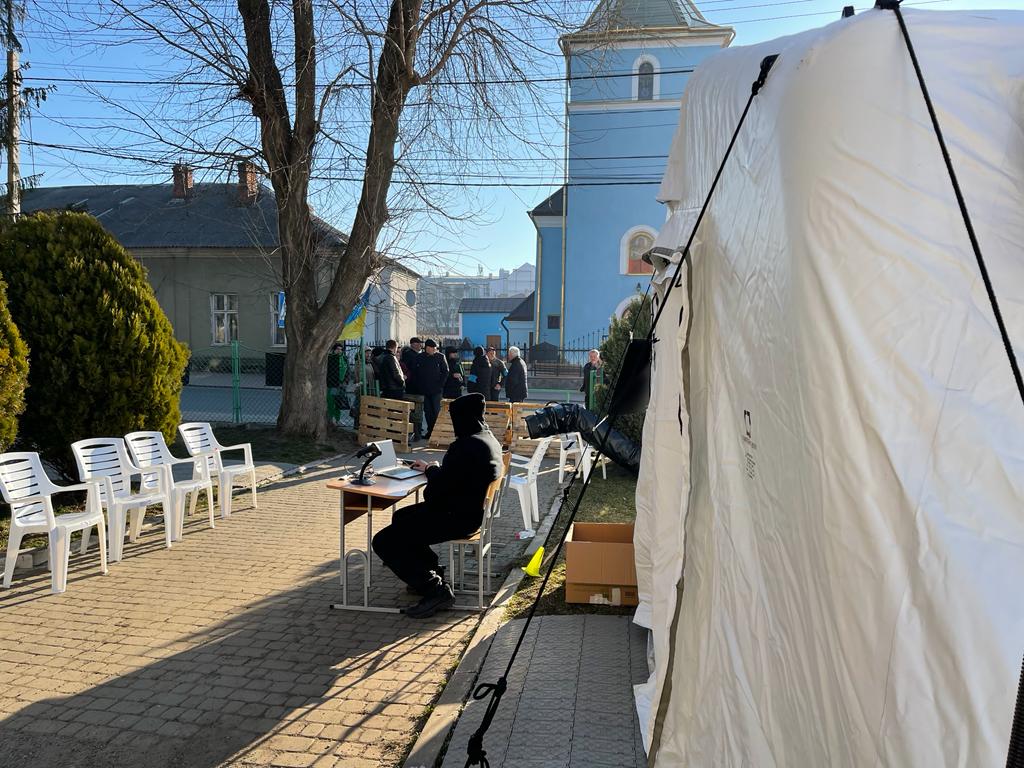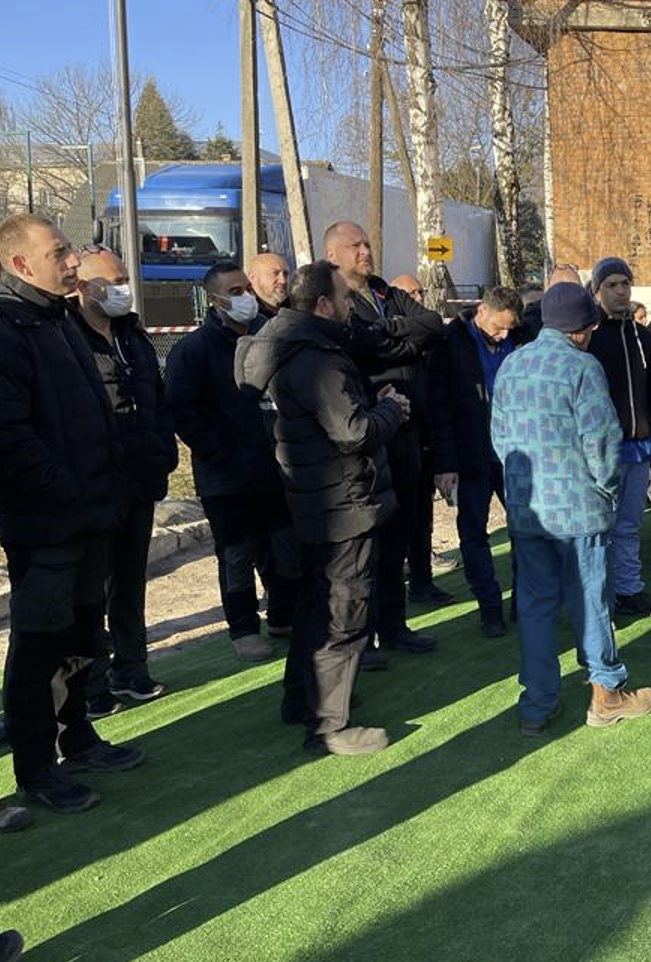"People Beg Us to Treat Them": The Commander Who Established the Hospital in Ukraine Speaks Out
Children and the elderly arrive for medical treatment, teams must provide assistance in tents, concerns about rising patient numbers, and the goal: to assist everyone. Yoel Har Even, the commander of the Sheba hospital responsible for operating the 'Kochav Meir' hospital in Ukraine, shares stories from the field.
 (In the circle: Yoel Har Even)
(In the circle: Yoel Har Even)When speaking with Yoel Har-Even this week, the commander of the Sheba Tel Hashomer Medical Center and head of the international division, one can hear a lot of activity around him. He is currently in Ukraine, in a city near Lviv, where he established, along with about a hundred staff members, the 'Kochav Meir' field hospital—intended for anyone in the area in need of medical assistance.
It's hard to find a free moment for a conversation with him, as it turns out that in the few days since the Israeli delegation arrived in Ukraine, they have already treated hundreds of patients, and it seems that the number is set to grow. Alongside the efforts to treat patients, Har-Even also devotes long hours to consultations and coordination with the Foreign Ministry, which also plays an active role in the hospital’s management, in terms of security and logistics.
Mobilizing to Help
The location chosen for the Israeli hospital, between Lviv and the Polish border, was considered very quiet until last week. However, that’s precisely when a few missile attacks occurred near the Polish border, making clear to the doctors and staff who arrived there that they were indeed in a war zone. Yet, this did not change their approach to the important mission, and no one thought to cancel their participation. This week, they took a special flight to Poland and from there continued in a convoy to western Ukraine.
"We left Israel on Monday morning and landed here in the evening," Har-Even recounts. "But in fact, the preparations began much earlier due to the large-scale logistics required. It must be understood that for us to provide treatment here, we need a lot of medical equipment, sent separately before we arrived. This equipment weighed 18 tons. Additionally, we flew an advance team about two weeks prior to adapt the hospital structure. Essentially, we built the entire medical setup from scratch in a school building lacking any medical facilities.
"Since the building isn’t large enough, we are also using the open schoolyard, where we set up tents on either side. This allows us to operate part of our operations inside the building, while the emergency rooms are positioned outside in the tents, staffed with teams, beds, and medical equipment."
Har-Even emphasizes the assistance provided by the Ministry of Foreign Affairs and Ukrainian embassy staff in setting up the hospital. "Many organizations are contributing substantial help so that the hospital can be effective, and so that everyone can perform their tasks in the best way possible."
Do you really believe optimal care can be given under such conditions?
"I am sure treatment can be provided. 'Optimal' or not is a matter of definition. It’s clear we can’t treat everyone or do everything. But what I have observed during our short time here is that the knowledge and technologies we brought from Israel are truly missing in Ukraine. We are dealing with a population in distress even without the war. Some of those coming to us mention they haven’t received professional medical care in years. You see the level of neglect here and feel it’s a significant mission to offer them advanced treatments and high-level services, as we bring from Israel."

How many people have you treated so far?
"Since we started operations, we have treated over 100 patients. I have no idea about their status or nationalities. To us, it doesn’t matter. We provide treatment to anyone who comes, without asking for names or details. Our sole interest is truly helping."
Har-Even stresses that most patients are not war casualties but come due to various medical issues. This is the only place where they can receive care since regular clinics are closed due to the war. He estimates that a large portion of those seeking help are refugees who reached the border area after fleeing central Ukraine. "When they hear about an Israeli hospital providing free assistance, they are very eager to take advantage of the opportunity," he explains.
What are the most common issues you encounter?
"Many elderly people come with various heart problems—some probably exacerbated by the war and the tense situation. There are also many women coming for prenatal check-ups, and children, some with issues like fever or various viruses, and others complaining of stray dog bites, likely dogs left behind due to the war. We have also identified several significant diseases in children that had never been diagnosed before. For example, today we received a girl previously treated and operated on in Israel. Now her parents wished to bring her back to Israel, but it was not possible due to her condition. They were so happy to hear they could bring her here and continue the Israeli treatment."
What will you do if the number of patients increases? Are you prepared to respond to everyone?
"We are currently prepared to handle about 150 inpatients and around 60 in the emergency room. However, we are aware that those numbers may very well increase, especially if the fighting continues and naturally, the medical needs grow. If reinforcements are needed—our people in Israel will be notified, and another delegation will be sent to us. We are only a three and a half-hour flight from Israel, making it easy to reinforce us."
He also isn’t worried that there won’t be medical staff willing to head to the front. "I can testify from close experience that when we assembled the delegation, there were doctors and nurses who practically begged to come but couldn’t due to lack of space. They would undoubtedly be happy to join us now."
Sirens During Treatments
How are you even managing to communicate with patients? Do they speak English?
"There are hardly any patients who speak English. The spoken language is only Ukrainian, but from the outset, we made sure to include as many Ukrainian speakers in our team as possible, so we have many translators available."
You can’t avoid asking about the atmosphere there—is it tense? Do you feel the war?
"When we first arrived, we almost forgot we were in a war zone," he recalls, "everything here is very calm and peaceful. But right after the official inauguration ceremony for the hospital, when we asked to step off the stage, we heard a siren. All of us, the Israeli delegation, hurried to find cover, and it was the Ukrainians who appeared calm and peaceful. Later they explained that their siren system is not as advanced as ours, and when bombardments occur, the sirens are heard even in areas far from the impact location, as their system cannot identify the precise attacked spot."

On the matter itself, he emphasizes that there is no sense of war at all in the area. "The atmosphere here is calm and very peaceful. Occasionally, sirens are heard, but as I mentioned—no explosions occur in our area. We do run and hide, but we quickly return to our activities."
And honestly, isn’t there a fear of what might happen? After all, the war could reach you at any moment...
"We are not afraid; I know the State of Israel coordinated the establishment of the hospital with everyone needed, and even informed the Russians of the precise coordinates of our facility. We are confident it won’t be attacked. Even if, G-d forbid, the war reaches our area, I assume it would first pass through Lviv, giving us enough time to make a decision on whether we are closing the hospital or staying."
In conclusion, Har-Even notes that he is personally very moved by the enormous project established. "The staff here shows immense dedication; they truly do everything they can to join the mission. Many left families and stable jobs to come and lend a hand, out of sheer goodwill and a desire to help. This is something unique to the State of Israel, being the first to be called to the flag and deciding to set up a field hospital.
"It’s also moving to witness the state’s constant care, the abundant equipment sent to us including even helmets and vests, so that we all feel protected. It’s a shame that such situations are needed to feel the strong unity and mutual responsibility. I wish we could feel these things even in routine times."

